In 2020, our University faced many challenges related, first of all, to the COVID-19 pandemic. Such circumstances required us to make significant changes in our work. As a result, Igor Sikorsky Kyiv Polytechnic Institute has made a transition to distance learning. In March last year, we began to take urgent actions to ensure a smooth transition. Everyone wanted to continue classes without interruption. At the same time, we wanted to preserve the quality of the study. Thus, we had to solve many tasks, for instance, informatization, automating administration of the educational process, providing the appropriate technical support of management, introducing a range of electronic documents, and others.
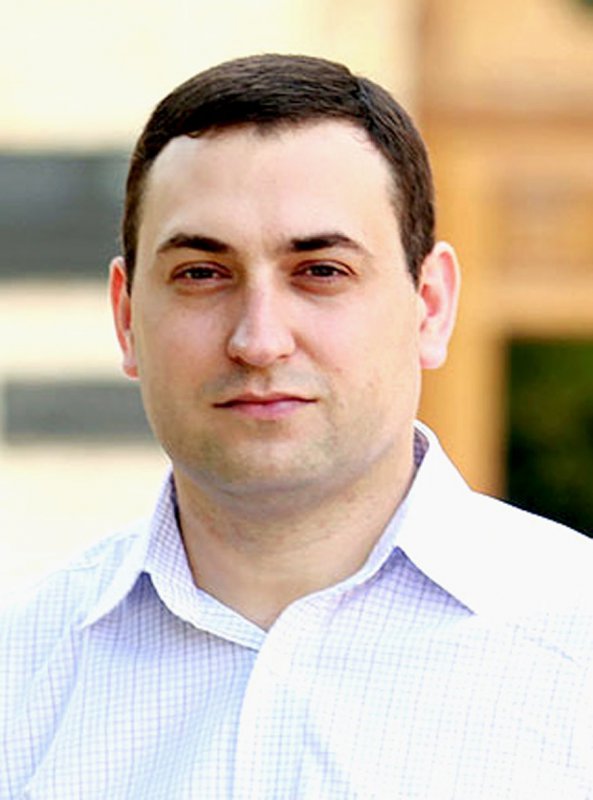 Moreover, every year stimulates competitiveness between higher education institutions. The universities' rankings and information space clearly show the situation. Therefore, Igor Sikorsky Kyiv Polytechnic Institute aims to improve our positions in international and internal ratings. At the same time, the University promotes the quality of education. Good education is the main guarantee of a respected academic reputation of a university. Besides, it is an integral part of international ratings. Also, quality education improves information interaction both with stakeholders and entrants.
Moreover, every year stimulates competitiveness between higher education institutions. The universities' rankings and information space clearly show the situation. Therefore, Igor Sikorsky Kyiv Polytechnic Institute aims to improve our positions in international and internal ratings. At the same time, the University promotes the quality of education. Good education is the main guarantee of a respected academic reputation of a university. Besides, it is an integral part of international ratings. Also, quality education improves information interaction both with stakeholders and entrants.
A certain challenge for us was the accreditation of study programs' under new rules. Such experience has enriched our departments with both a brand-new and helpful experience. And even in this situation, we faced certain collisions. Let me tell you, for instance, while preparing for accreditation of the Doctor of Philosophy study programs, we have found out that there are no approved standards of higher education of this level of higher education in Ukraine. Therefore, accreditation should carry out based on such sample projects.
With the beat, an educational process and higher education promotion require updated study programs addressing the world and national trends in the economy. The world today moves to a new stage, the so-called “supercycle” which corresponds to the sixth technological cycle of Nikolai Kondratiev’s Long Wave Theory. Such periods typically provide significant economic changes, crafts, emerging new social relations, and new industries. The system of training specialists must respond adequately to these new challenges.
It is critically important that our study programs are competitive both in the national and international education markets. The main task for Igor Sikorsky Kyiv Polytechnic Institute is to allow for the trends and scenarios of the global economic development. The University aims to ensure the labor market requests and preserve the strength of scientific and pedagogical schools. These are our traditions of fundamentality, a combination of educational and scientific activity, and promotion of innovation.
I should remind everyone that last year the Department for Education had organizational changes (slide 1). Besides traditional units, the Design Bureau of Information Systems (DBIS) and NTO “KPI-Telecom” became subordinate to the Vice-Rector for Education. Besides, the Coordination Center for Study Programs in National Security and Defense has been established. The Center's task is to coordinate the University departments in training specialists in the relevant areas and specialties.
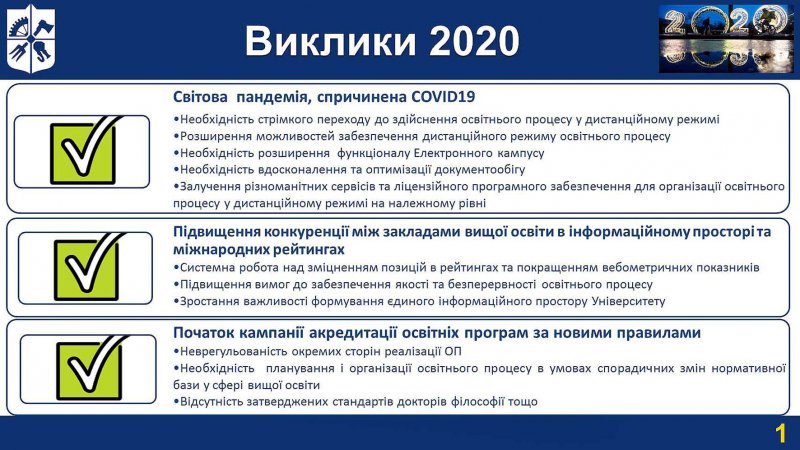
Regulatory framework update
One of the key tasks for Igor Sikorsky Kyiv Polytechnic Institute was to prepare a new regulatory and legal framework. The University has adopted the core regulation of the educational process - the “Regulation on the organization of the educational process at Igor Sikorsky Kyiv Polytechnic Institute”. We have also developed and implemented the “Regulation on the student’s Individual Study Plan at Igor Sikorsky Kyiv Polytechnic Institute”, the “Regulation on certificate programs”, and the “Regulation on the implementation of the right to choose educational disciplines”. Also, we have enhanced information support while studying to meet the needs of both teachers and students.
In 2020, the “Regulation on the development, approval, monitoring, and revision of study programs at Igor Sikorsky Kyiv Polytechnic Institute” has been developed to consider all components of high-quality study programs. This regulation determines the procedures and mechanisms of all stages from the moment of initiating a program to its accreditation. It also defines people responsible for these stages. A study program is similar to a living organism that is growing and changing, so the regulation focuses on monitoring and revision of a study program. I must admit that every accreditation procedure is not without showing this regulation.
Distance education
The imperatives of our times are the “Regulation on distance learning at Igor Sikorsky Kyiv Polytechnic Institute” and “Regular maintenance in distance mode”. Among the issues of the Regulation are providing an educational process in remote mode by means of the Sikorsky Distance Learning Platform; students, research and teaching staff implementing innovative approaches to higher education; requirements for distance courses; student’s individual educational trajectory, etc. “On approval of semester control Regulation in distance mode” and “the Regulation on organizing and submitting qualification works and attestation examinations in distance mode” use distance learning technologies, and displays the results of current assessment and session in the Electronic Campus System providing reliable identification, audio and video of a related assessment activity, and others.
The distance learning made us pay more attention to software. The University has provided the faculties the opportunity to choose software for learning and other resources that the “Sikorsky” platform can ensure (it includes the Google Workspace and Moodle platform), as well as use other resources and platforms, including Zoom, Webex, etc. (Slide 2).
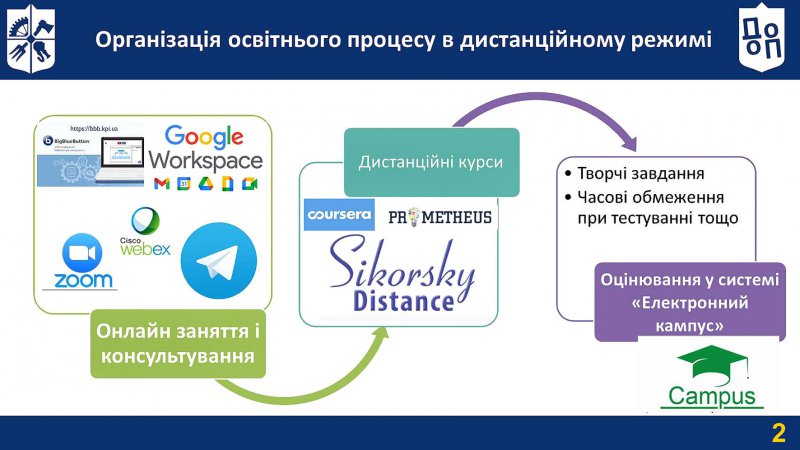
The Sikorsky Distance Learning Platform has been filled with distance courses throughout the year. Today, we already have an updated site that allows structuring the Google Workspace courses. This work is accomplished in an informed and systematic way. No doubt, some departments develop and upload distance courses successfully, while some lag behind. Nevertheless, departments go on working. As a result, we have several thousand courses on the Google Workspace and Moodle platform. Moreover, the University has intensified software opportunities and attracted the programs of the relevant partner agreements. These are licensed software: Office 365, Proto Labs, Microsoft Azure and others. Also, last year the University signed an agreement on more than 2000 licenses of a solid modeling computer-aided design (CAD) and computer-aided engineering (CAE) computer program SolidWorks.
Study programs management
The main task for us was to manage study programs implemented at our University. There are more than 300 study programs. They are constantly being developed and upgraded.
The process of developing a study program ends with its external accreditation. External accreditation, however, marks the completion of developing a study program. Previously, each study program is under three stages (slide 3). The first stage is a program establishment when the working project groups and the University Education and Methodological Committee jointly with stakeholders initiate a study program. The second step is a program implementation when the Department of Education and the Department for Student Affairs are training students under the Regulation on the organization of the educational process at Igor Sikorsky Kyiv Polytechnic Institute. Finally, the third stage takes place annually when departments do self-examination (internal accreditation) to ensure the education quality and prepare for external accreditation.
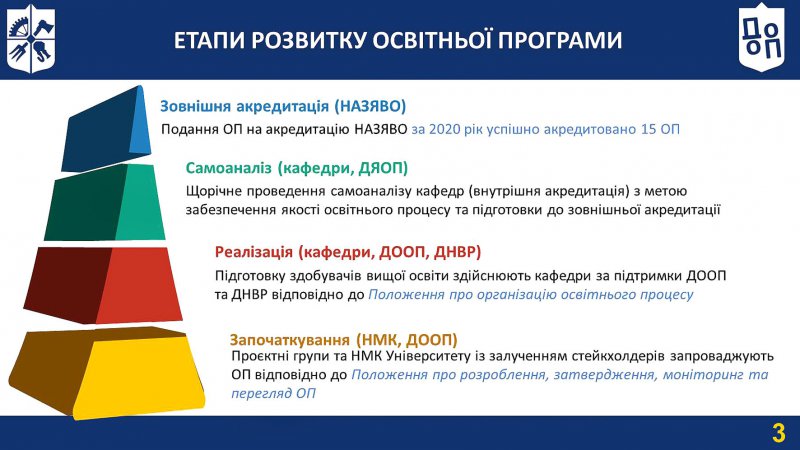
In 2020, the National Agency for Higher Education Quality Assurance (NAQA) began study programs accreditation. In total, within the year, 15 study programs of the first and second levels of higher education have been accredited. One of them is of an innovative character.
Faculties began not only to use the gained experience and resources of the University. They also consider the work of the project groups and standards of higher education. At the same time, faculties also regard student opinions, take into account the employer feedback, and depend on the documents based on the adopted last year University Strategy Plan 2020-2025. The experience we gained has proven that external accreditation is an issue of great importance. Successful accreditation will give a significant improvement of our work and clean it from outdated components.
Today, all departments work under those algorithms of proceedings that we have set and put into practice. Academic disciplines of the General University and Professional Catalogs of subjects reveal the specifics and uniqueness of study programs, which, in turn, are accomplished in curriculum and educational activities. The general parts of our Individual Study Plans, University catalogs, and reference books of academic disciplines contain individual points traditional for our University. Our work provides for a typical structuring of study programs considering the requirements of higher education standards. Still, in some cases, we always meet the department proposals that can change the individual components of study programs and the Individual Study Plans.
It is worth mentioning certificate programs. A year ago, we developed and introduced the “Regulations on certificate programs”. In spring, 6 such certificate programs for the Faculty of Management and Marketing, the Institute for Applied System Analysis, and the Faculty of Sociology and Law were accredited. This year, 7 certificate programs for other faculties have already been approved. Moreover, the Education and Methodological Department received some certificate programs that the departments will implement. In total, next year, we will have approximately 25-30 accredited certificate programs.
Choosing University disciplines
One of the base components of our work is to ensure a free choice of disciplines. Last year, students chose subjects in the General University Catalog (ЗУ-каталог) of the e-Campus System and the Professional Catalog of Disciplines (Ф-каталог) basing on paper questionnaires, using Google forms, and their choice. Today, students can choose subjects through the Electronic Campus. This way, it is easier to form inter-department and inter-faculty training groups and implement certificate programs.
Dual education
Last year Igor Sikorsky Kyiv Polytechnic Institute adopted an updated version of the Regulation on the dual form of higher education. However, training on the dual education system or using its elements has begun much earlier at our University. The introduction of norms on the dual education system as a separate form of higher education in the Law of Ukraine “On Higher Education” allowed us to settle many issues. The University currently has programs with elements of such a model of study and full programs of the dual education system. The new Regulation requires the ECTS credit units, which combine apprenticeships in a company and vocational education involving employers in education. Also, we have worked out a mechanism for introducing such training (slide 4).
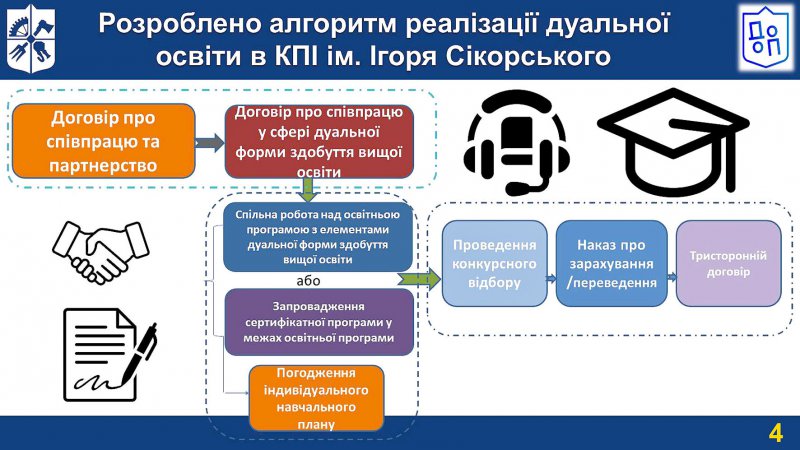
Postgraduate and doctoral studies
In 2020, the “Regulation on the organization of the educational process for Ph.D. (Doctor of Philosophy) students at Igor Sikorsky Kyiv Polytechnic Institute” and “the Regulation on the organization of the educational process for Ph.D. (Doctor of Sciences) students at Igor Sikorsky Kyiv Polytechnic Institute” were developed and approved. Under these documents, Education and Methodological Committees made decisions on the educational component because there are no higher education standards for these levels of higher education. The University offers postgraduate and doctoral training again. However, only individuals who work at Igor Sikorsky Kyiv Polytechnic Institute can study under relevant terms. There is a new Ph.D. program in specialty 281 “Public Administration”. However, obtaining higher education for these levels is in question because only one-third of postgraduate students end postgraduate study. Some postgraduates withdraw, some take academic leaves. Thus, we have a problem submitting Ph.D. theses.
Practical training
Pandemic has significantly hit our organizing capabilities of practical training. The Department coordinates traineeship and sends students for practice under the signed University agreements. We organized more than 1000 places for bachelor students for practice, but only 2% were used. Since the practice for bachelor's students was in April last year, when the lockdown was introduced, most enterprises refused to take practitioners. For reasons for preserving the health of our students, we permitted to practice at the departments. Only in autumn, when we sent master students to the practice, we could improve this situation.
Diploma works, projects, Ph.D. theses, and their results
To complete one's education a specialist prepares and presents a bachelor or master thesis, which confirms each student's integral competence. The results of bachelor or master thesis presentations show a trend when faculties have very few diploma works recommended for implementing or launching startups. Yet, departments present quite a high number of diplomas with honors. Startup initiative is an integral part of the demands for master thesis; so far, our departments implement it in different ways. However, the skill of launching startups is mandatory in training a specialist-innovator whose competencies require not only engineering knowledge and skills but also entrepreneurial, economic, and managerial skills.
Sociological monitoring of stakeholders in education
Sociological monitoring as a feedback instrument from all stakeholders in education, for instance, students, employers, graduates, and scientific and pedagogical graduates became part and parcel of our work. Employers continue to commend the graduates of Igor Sikorsky Kyiv Polytechnic Institute. Most of them believe that our graduates' qualification completely or almost meets the requirements for work (slide 5). On the other hand, almost a quarter of employers responded about some disadvantages that decrease the work quality of our graduates. The first thing is the lack of practical training - that is why sound professional practice for students is now one of our main tasks.
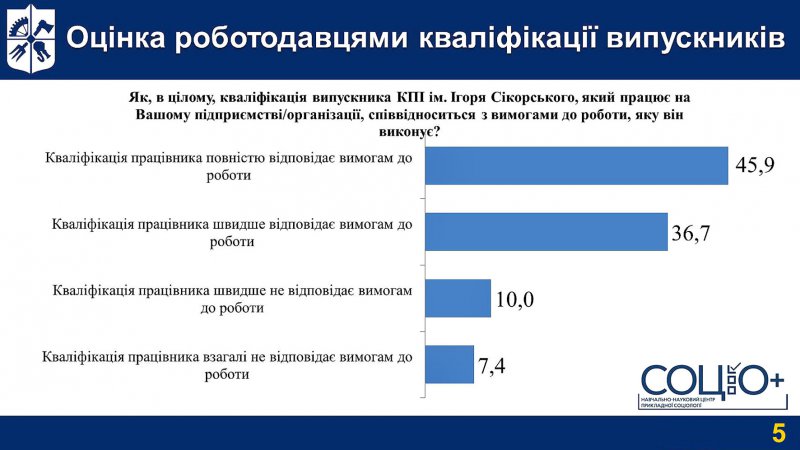
We also conduct student surveys. We should complement our students: more than half frankly recognizes that they do not study to the best of their abilities. Furthermore, it is significant that the proportion of the students not studying at full capacity and missing out on many classes remain connected with the students expelled under the results of sessions or those who hardly pass examinations. Still, at the same time, mostly study programs appeal to students, and they would choose them again, if needed. The survey “Teacher with Students Eyes” held at the University many times gives quite unexpected results. Students consider almost 40% of teachers genuine professionals while 50% have estimates above the average (slide 6). Yet, students believe some teachers are not at the level of Igor Sikorsky Kyiv Polytechnic Institute. Department heads, as well as teachers, can see these feedback results in their Personal Cabinets. Thus, they can and must take note of the feedback in their work.
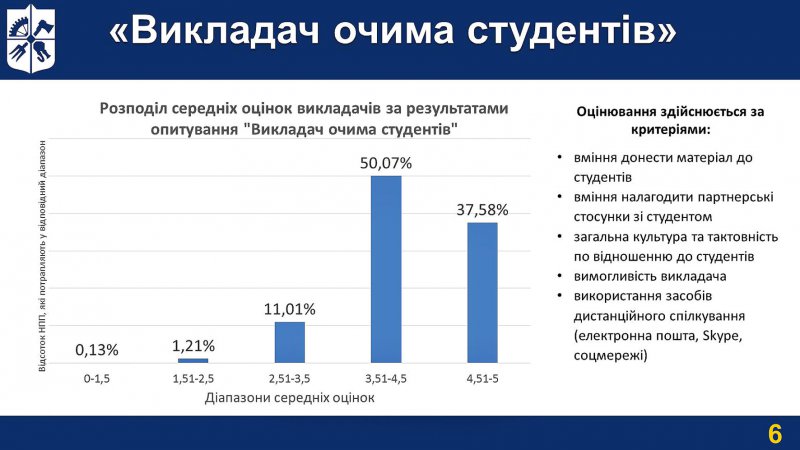
Methodological support and maintaining academic integrity
In 2020, the Expert Council on Education Editions considered and recommended publishing 30 textbooks from the authors of 12 faculties/institutions. The leading positions belong to the Faculty of Chemical Technology, Faculty of Management and Marketing, Faculty of Chemical Engineering in the latter years. Unfortunately, 11 faculties/institutes failed in publishing activity in 2020.
To promote the culture of academic integrity at Igor Sikorsky Kyiv Polytechnic Institute, we are constantly improving the legal and regulatory framework in this area. Moreover, Igor Sikorsky Kyiv Polytechnic Institute participates in the project “Initiative of Academic Integrity and Quality of Education” implemented by the American Councils for International Education in collaboration with the Ministry of Education and Science of Ukraine and the NAQA with the support of the US Embassy in Ukraine. We provide a training course and technical support to the staff in this area. Also, the Professional Catalog of Disciplines (Ф-каталог) has the discipline “Academic Integrity”.
Informatization in managing the University units
Igor Sikorsky Kyiv Polytechnic Institute units work in a single information environment. It is quite diverse and has many subsystems (slide 7). One of the main tools for ensuring our work became the “Electronic Campus” (EC) System. It was its capabilities that helped us not only quickly turn into distance learning but also to conduct sessions. In 2020, the EC System constantly developed: Student's Personal Cabinet and Teacher's Cabinet improved. Also, we added several pieces of software for department heads and deans/directors, deans’ office staff, and a separate software module of the Admission Committee. It already works and enrolls in master's degree programs. We continue to advance the EC System even now.
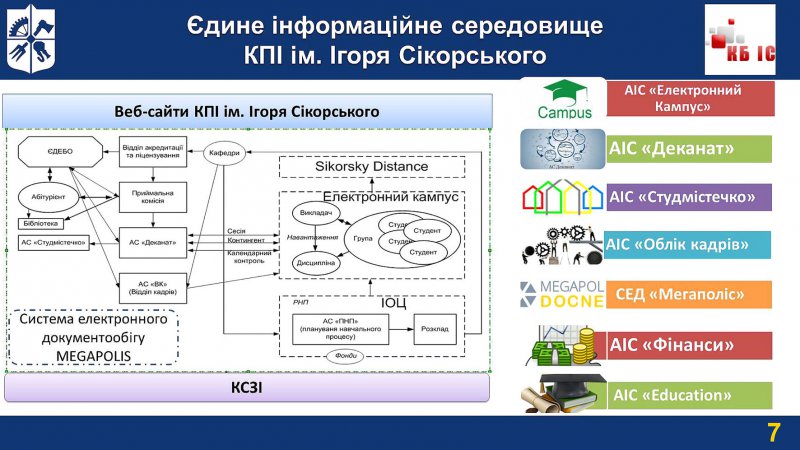
Moreover, the Design Bureau of Information Systems supports the automated systems “Dekanat” (Dean's Office), “Studmistechko” (Campus), “Oblik Kadriv” (Personnel Records), etc. The Bureau also supports and improves the Automatic Information System (AIS) “Finansy” (Finance) and actively introduces the system of electronic document MEGAPOLIS.
However, one of our key tasks is to create an information system updated on modern principles. Therefore, now jointly with the TOV INVO DIGITAL, we form a comprehensive system of automated education and management processes. This organization has significant experience in developing such products for Ukraine and other countries. Soon, we will begin testing the developed software modules.
Last year, one of the basic needs was reliable data security and cyber-security protection. We will probably never forget a powerful DDoS attack from almost 200 thousand accounts, that last fall stopped the work of our networks for two days. We addressed cyber police to investigate this crime. The University, however, used many measures to secure from such troubles in the future. In particular, to preserve the personal data of students and teachers, a part of services and information of the core University units will be placed in a cloud environment and others.
The main unit providing the University Information Activity is the NTO KPI-Telekom. Last year the organization strived to maintain the University telecommunication system and security signal system. It also developed access networks and engineering technological systems. KPI-Telekom created data channels and established the final devices of the automatic heat supply accounting system (32 objects), auto-accounting systems (5 objects), access control systems in campus buildings (5 campus buildings), and automatic control systems in dormitories (3 dormitories). Also, the organization provided multi-server telecommunication services, for instance, technical support and further development of the video surveillance system of the University. KPI-Telekom launched video conferencing services based on open-source software bbb.kpi.ua and VPN connecting service from the Internet to internal corporate networks. Moreover, the NTO KPI-Telekom carried out the integration of the University Information Environment in the World Information Space and implementation of corporate network protection systems from external cyber-attacks.
Information policy improving
The core tools for implementing the information policy at Igor Sikorsky Kyiv Polytechnic Institute are information and communication resources. These are accounts in social networks, department websites in the kpi.ua domain, the Media laboratory, the newspaper “Kyiv Politechnic” (Slide 8). In 2020 the University introduced the Regulation on their internal certification. 25 websites of departments/institutes, 144 websites of education and science departments, 23 telegram channels of education and science departments passed certification. 157 Facebook pages of departments, 12 telegram channels of departments/institutes are under consideration. Every week we are monitoring 144 websites of departments and their English-speaking versions, 23 telegram channels of education and science departments and telegrams bots of deans’ offices, 144 Facebook pages of education and science departments. Also, the Council for Information Policy has been established to promote a strategy of information policy of Igor Sikorsky Kyiv Polytechnic Institute and consider its essential aspects.
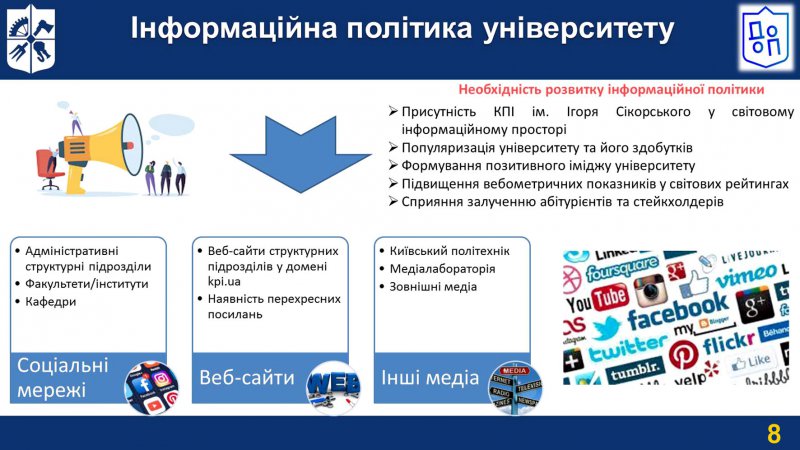
In the end: our strategic tasks per the year 2021
Our main tasks per the year 2021 include optimizing the administration system of the educational process; creating a digital education environment, developing a system of mixed and distance learning; improving information policy; developing study programs, their methodological and resource provision to promote accreditation; further informatization of education and management activity; strengthening the academic reputation of the University as an evaluation component in the world rankings.
